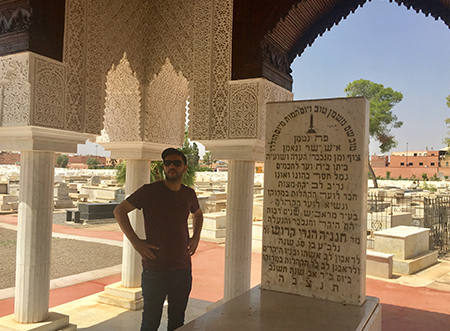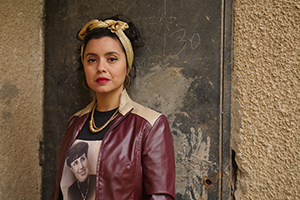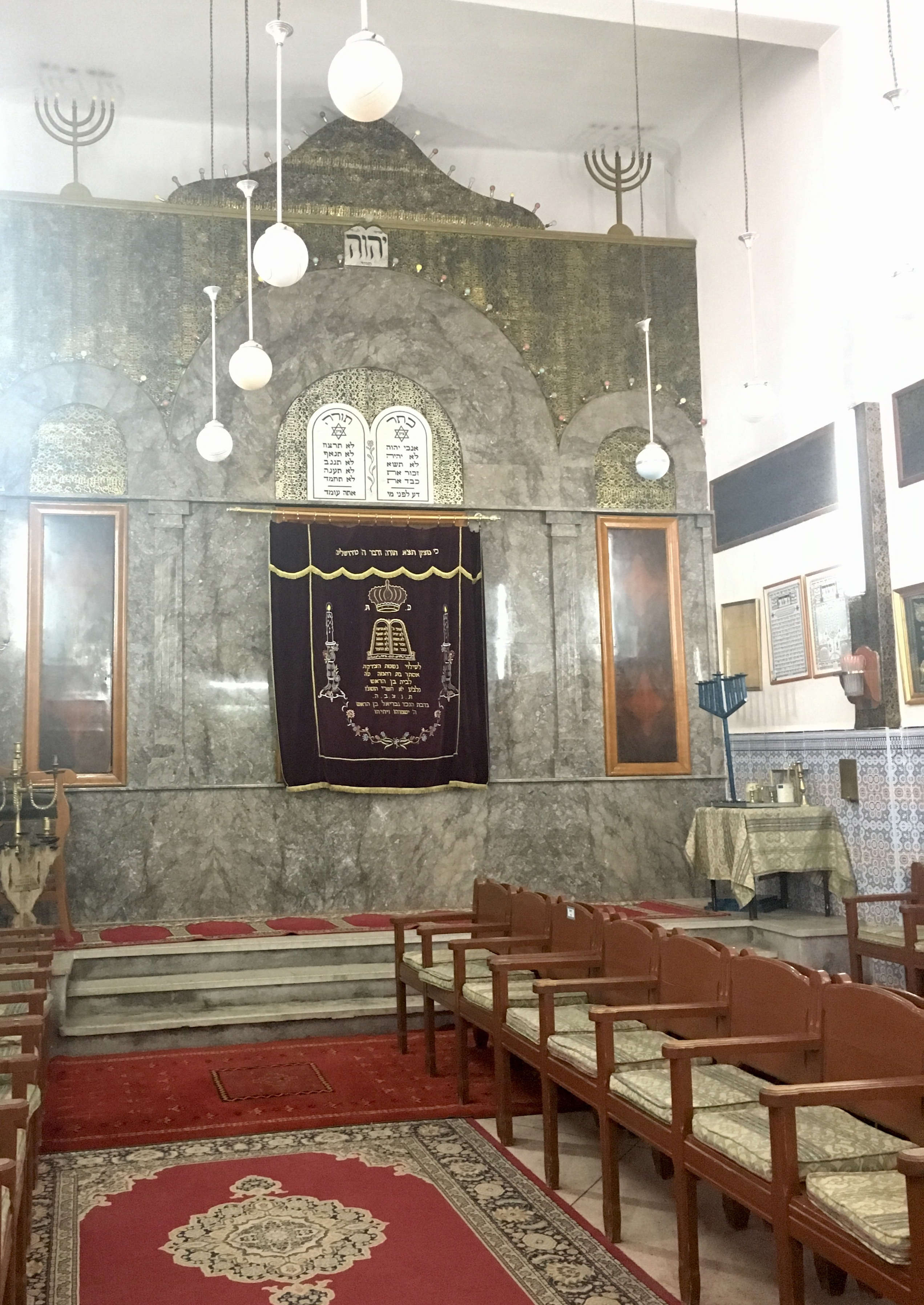Wider World
Israelis Embrace Their Moroccan Cultural Roots

Wearing a baseball cap and sunglasses against the beating sun, Kobi Ifrach is guiding tourists through the Miaara Jewish Cemetery in Marrakesh. Built in 1537, the cemetery sits next to the mellah, the city’s Jewish quarter renowned for its terra cotta-colored walls and narrow walkways. Ifrach notes points of interest among the thousands of gravestones and whitewashed tombs and gestures at the mausoleums that stand along the perimeter. They are the resting places of Moroccan rabbis, often adorned with candles lit by visitors. Having recently spent six months helping renovate this once-decrepit burial ground, Ifrach, 35, can easily pick out the graves of particular interest to Israeli visitors of Moroccan descent.
A group of French tourists passes nearby, and Ifrach calls out an Arabic greeting to their Muslim tour guide: “Salaam Alaikum.” The guide amiably responds to Ifrach in Hebrew, “Shalom. Mah koreh?” Hello. What’s up?
Thousands of miles away, at a packed convert venue in Tel Aviv, Neta Elkayam performs a tribute to the late Jewish singer Zohra Al Fassiya, a pioneer of modern Arabic music and one of the first female recording artists in Morocco. A superstar in her home country, Al Fassiya, who passed away in 1994, was unable to find a following in Israel after she moved to the country in the 1950s.
For the tribute, Elkayam, 37, lends contemporary rhythms to the North African singer’s unique vocalizations. “Through this show,” she says, “we tried to bring her name to the Israeli public, in order to not forget our heritage.”
Though Elkayam and Ifrach were born in Israel, they embrace their Moroccan background. Their parents left Morocco for the Jewish state in the mid-20th century, part of the wave of emigration of most of the 300,000 Jews then spread throughout the North African nation. Today, fewer than 3,000 Jews remain, primarily in Rabat, Fez, Casablanca and Marrakesh. The majority of the community resides in Casablanca, the country’s economic center and largest city, and around 500 live in Marrakesh.
In contrast, some 485,000 Jews of Moroccan descent now live in Israel, according to Israeli government data, making them the second largest ethnicity in the country after Russians. Elkayam and Ifrach represent a growing phenomenon—second- or third-generation children of Moroccan immigrants seeking to reconnect with the land their parents left behind.

Around 60,000 Israelis—many, though not all, Moroccan progeny—visit the kingdom each year as tourists, according to Ifrach. He estimates that figure will reach 100,000 annually by 2020. Dozens of Israelis routinely travel between the two countries for business. At least 15, including Ifrach, who left Dimona for Marrakesh in October 2015, have moved to Morocco.
Although no official diplomatic ties exist between the countries, Israel and Morocco have relatively good relations. And while many Muslim-majority countries officially forbid Israeli citizens from entering, Morocco has no such restrictions. Still, Israelis who visit tend to do so through tour guides like Ifrach or through a travel agency.
Previous generations of Moroccan Israelis had distanced themselves from their roots to better integrate into a society that elevated Ashkenazi culture and often discriminated against Moroccan and other immigrants from Arab countries. Today, however, many see their heritage as a source of pride.
“When we were kids, we felt ashamed to speak Arabic,” says Elkayam, who lives in Jerusalem. She recalls feeling a gap “between what was happening in Israeli society and in school and then what was happening inside my house, which was full of other sounds and music, Moroccan Arabic and food.”
After visiting Morocco in 2013 to participate in the Andalusian Middle Eastern Music Festival, she realized there is no need to separate her two identities. “You can be Israeli and Moroccan,” she says.
Since then, Elkayam has returned over 10 times, playing at festivals and Jewish weddings and even inside the Beth-El Synagogue in Marrakesh—the first time a woman has performed there, she says.
With funds from the current king, Mohammed VI, who also financed the renovation of the Miaara cemetery, Ifrach has overseen partial renovation of another synagogue in Marrakesh, Slat Al Azama. Built in 1492 by Jews who fled the Spanish Inquisition, the picturesque house of worship with Islamic-style arches along its façade and a blue-tiled courtyard is one of the oldest continuously operating synagogues in the world.
Prior to its renovation, Slat Al Azama, in the mellah and a five-minute walk from Miaara, drew about 10 tourists a day—nearly all Jewish. According to Ifrach, it now attracts between 100 and 200 visitors per day, most of them Christian or Muslim.

Ifrach is also bringing Moroccan traditions back to Israel. Last summer, he traveled to the Jewish state to launch Project Elul, a curriculum covering Moroccan history and culture with a special focus on the Jews’ positive relationship with the Muslim community. The inaugural course attracted 37 college-aged Israelis—both Ashkenazi and Mizrachi—for six weeks of classes in August and September in Yerucham, a Negev town with a large North African Jewish population. “There’s so much knowledge and richness of culture that disappeared, and we want to bring it back,” Ifrach says.
When Israeli teachers and officials tell the story of aliyah from Arab lands, says Tal Ohana, 33, “they tell it through a narrative of escape, of rescuing Jews from Islamic countries.” That is not true for the Jews of Morocco, she notes. “Most of their life was a life of security.”
Ohana, whose parents emigrated from Morocco in the mid-20th century, is the deputy mayor of Yerucham and helped Ifrach raise funds for Project Elul. “We want to connect to our roots and be proud of our roots,” she says during a recent visit to Marrakesh, one of her many yearly visits to the country.
In addition to her political career, Ohana works with the International Fellowship of Christians and Jews to bring food and medical care to Morocco’s Jewish poor, who make up approximately 30 percent of the community. The fellowship also supports organizations like Association Mimouna, which educates young Muslims about their country’s Jewish history through interfaith events. Association Mimouna was founded by Muslim university students and is named for an end-of-Passover festival observed by Moroccan Jews, who once celebrated it with their Muslim neighbors. Mimouna continues to be observed in Moroccan enclaves in Israel.
The unique relationship between the Muslim and Jewish communities is one of the reasons the Jews who remain in Morocco feel safe, asserts Ohana, even as they are aware that they are a small minority in a Muslim nation of 35 million.
“The Moroccan government works hard to prevent radical Islam from taking hold,” says Jacky Kadoch, 70, president of the Jewish community of Marrakesh. “But we have to be cautious, always.” Kadoch worries that in 10 years, there will be no Jews left in Morocco. Today, most young Jews move away to attend college in Israel, France or the United States. Their parents usually follow, leaving behind the poor and elderly.
On a recent trip to Morocco, Ohana visited one such resident, Sol Ben Ezra, 85, in Casablanca. Ben Ezra remembers the younger woman from a previous visit and chats with Ohana about her difficulties leaving her apartment. The elevator in Ben Ezra’s building has been broken for two years, and she cannot easily descend from her fifth-floor apartment. Kissing Ben Ezra goodbye, Ohana promises to try to get the elevator fixed.
Among her many projects advocating for North African Jews in Israel, Ohana helps new immigrants from Morocco with their transition to Israeli society, educating them about schooling and employment options. Noting that her parents didn’t have anyone to help smooth their transition, Ohana says she sees her work as a means of “repairing” the negative experiences of her parents and grandparents.
She also describes the longing of her generation “to be connected to Morocco, because that gives our identity and our personal story in the world much more meaning.”
More than that, Ohana adds, “I have a desire to give back, to give thanks. Because there is no doubt that Morocco gave us so much. The story of my family on both sides is a story of a good life. Yes, they were very poor, but they lived in peace with their Muslim neighbors. They only left because of their desire to return to their Jewish homeland.”
A History of Coexistence
Morocco is home to the largest Jewish population in the Arab world. Yet the 3,000 Jews in the country stand in stark contrast to the 300,000 who lived there in 1948, before the start of mass immigration to Israel.
Jews are so integral to Morocco’s national identity that they were recognized in the 2011 reforms to the Moroccan Constitution, which included in its preamble that the “sovereign Muslim State” is “nourished and enriched by its African, Andalusian, Hebraic and Mediterranean constituents.” Judaism existed in the area long before Islam was born. Community lore cites a Jewish presence before the First Temple was destroyed in 586 BCE. After the destruction of the Second Temple in 70 CE and the Roman conquest of Judea, Jews spread throughout the Roman Empire, including the area of North Africa that later became Morocco. A second wave of Jewish exiles arrived in 1492 with the Spanish Inquisition, and the sultan at the time offered Jews refuge in his kingdom.
Morocco’s role during the Holocaust serves as the most dramatic example of the kingdom’s long history of protecting the Jewish community. During World War II, the Nazi-supporting Vichy government controlled the country. Despite orders to send the country’s Jews to concentration camps, Morocco’s king refused. “There are no Jews in Morocco,” King Mohammed V famously told the Nazis. “There are only Moroccans.”
The vast majority of Morocco’s Jews left following Israel’s establishment, but not because of any sort of systematic persecution. To be sure, there were violent attacks, most notably in a 1948 riot in which 44 Jews were killed. Yet these were isolated incidents that paled in comparison to the violence perpetrated against Jews in other Arab lands at the time.
Beginning in 2010, King Mohammed VI has spearheaded a national effort to rebuild and renovate hundreds of Jewish sites throughout the country. Today, Casablanca is home to the Moroccan Jewish Museum, the only Jewish museum in an Arab nation. In 2011, the country hosted the Muslim world’s first-ever Holocaust remembrance conference, which was organized by Association Mimouna.
Yardena Schwartz is an award-winning freelance journalist based in Tel Aviv.










 Facebook
Facebook Instagram
Instagram Twitter
Twitter
Marlene Schillinger says
Thank you so much. This is very helpful. I do have another question. There was a Jewish women living in Casablanca that specifically gives tours. I would like to engage her for a tour with my family.
Thank you again for your assistance.
Catherine says
Did you receive information about the woman? Did you visit Temple Beth-El while in Casablanca? We are very interested and will be in Morocco at the end of February 2019.
Catherine says
Just left a message with a type in my email address – very sorry!